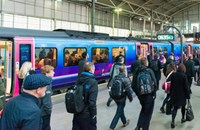
Work to electrify TransPennine and Midland Mainline railways will resume under plans announced yesterday, Wednesday 30 September 2015, as part of Sir Peter Hendy’s work to reset Network Rail’s upgrade programme.
Sir Peter Hendy has outlined to the Secretary of State for Transport how work could continue. The Secretary of State has replied to the Chair of Network Rail asking Network Rail to un-pause this work.
Network Rail will work with the Department for Transport (DfT) and Rail North to develop a new plan for electrification of the TransPennine line between Stalybridge and Leeds and on to York and Selby to focus on delivering key passenger benefits as quickly as possible. This is an improvement on the previous plan which only changed the power supply of the trains.
The new plan will deliver faster journey times and significantly more capacity between Manchester, Leeds and York. The upgrade is expected to provide capacity for 6 fast or semi-fast trains per hour, take up to 15 minutes off today’s journey time between Manchester and York and be complete by 2022. When the work is finished, the whole route from Liverpool to Newcastle (via Manchester, Leeds and York) will be fully electrified and journey times will be significantly reduced compared to today’s railway.
Network Rail will also recommence work to electrify Midland Mainline, the vital long-distance corridor which serves the UK’s industrial heartland. Sir Peter Hendy is proposing that line speed and capacity improvement works already in hand are added to, with electrification of the line north of Bedford to Kettering and Corby by 2019 and the line North of Kettering to Leicester, Derby/Nottingham and Sheffield by 2023.
New Northern and TransPennine rail franchise awards will be announced before the end of the year. The new franchises will:
- deliver new train carriages and remove out-dated Pacer trains
- introduce free Wi-Fi on trains
- offer a one-third increase in capacity with 200 additional services on weekdays and Saturdays and 300 more train services on Sundays
The total programme of rail electrification and upgrades will completely transform the railways for passengers in the north and Midlands and help ensure that every part of Britain benefits from a growing economy.
Secretary of State for Transport Patrick McLoughlin said:
As a one nation government we are making sure every part of Britain benefits from a growing economy. Connecting up the great cities of the north is at the heart of our plan to build a Northern Powerhouse. This government will see the job through and build a better, faster and more reliable railway for passengers in the north and Midlands.
Chairman of Network Rail Sir Peter Hendy said:
“The temporary pause in the programme has given us the space to develop a better plan for passengers. People can expect more services and faster journeys. We face some difficult challenges, and there is more work still to do, but the Secretary of State’s decision means we can now move forward with our plans to electrify TransPennine and Midland Mainline”.
About Department for Transport
We work with our agencies and partners to support the transport network that helps the UK’s businesses and gets people and goods travelling around the country. We plan and invest in transport infrastructure to keep the UK on the move.
We are responsible for:
- providing policy, guidance, and funding to English local authorities to help them run and maintain their road networks, improve passenger and freight travel, and develop new major transport schemes
- investing in, maintaining and operating around 4,300 miles of the motorway and trunk road network in England through Highways England
- setting the strategic direction for the rail industry in England and Wales – funding investment in infrastructure through Network Rail, awarding and managing rail franchises, and regulating rail fares
- improving English bus services through funding and regulation
- working to make our roads less congested and polluted by promoting lower carbon transport, including cycling and walking
- encouraging the use of new technology such as smart ticketing and low carbon vehicles
- maintaining high standards of safety and security in transport
- supporting the maritime sector by producing the overall strategy and planning policy for ports in England and Wales
- setting national aviation policy, working with airlines, airports, the Civil Aviation Authority and NATS (the UK’s air traffic service)
The Department for Transport and our agencies employ around 18,245 staff and 354 non-payroll staff, who work in locations across the country.




Comments
There are no comments yet for this item
Join the discussion